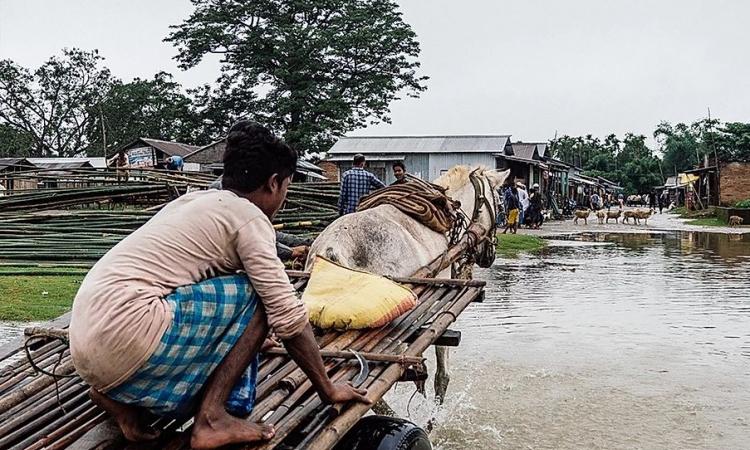
Flood situation in Assam continues to remain grim
A second wave of floods have gripped the state and so far around 16 lakh people have been affected across 22 districts with Barpeta district worst affected. The death toll owing to floods has also climbed up to 34. The floodwaters have submerged nearly 72,717 hectares of croplands and affected 2,053 villages under 60 revenue circles in the flood-hit districts. A total of 12,597 people have taken shelter at 163 relief camps and many others still taking shelter on roads, embankments and other safer places. While the water levels are currently receding, Brahmaputra, Dhansiri, Jia Bharali and Kopili rivers are still flowing above danger level in many parts of the state. (India Today)
Odisha prepares itself to battle floods
As part of its calamity preparedness, the Odisha government has identified 49 vulnerable points in river embankments which could breach in the event of floods during this monsoon. Along with this, the state government has kept in alert 20 OFRAF teams from June 1 to November 30 for any flood in identified vulnerable districts and measures are being taken to set up temporary VHF centres where telecommunication may not be possible during the floods. As the meteorological department has predicted a good monsoon this year, the state has prepared a standard operating procedure if floods take place after July. Also, the state has stored medicines and essential food items at the gram panchayat level and as many as 879 multi-purpose cyclone and flood shelters are being kept in readiness for the possible eventualities. (Outlook India)
Global E-waste Monitor 2020 report informs that the world recycled only 17.4 percent of e-waste
According to the UN-led Global E-waste Monitor 2020 report, the world dumped a record 53.6 million tonnes of e-waste last year and recycled just 17.4 percent of the e-waste. Passing on the message that the way the world produces, consumes and disposes e-waste is unsustainable, the report informed that even countries with a formal e-waste management system in place are confronted with relatively low collection and recycling rates. Further, China, India and the United States together accounted for nearly 38 percent of the world's e-waste last year. China being the biggest contributor to e-waste generated 10.1 million tonnes, followed by the US, with 6.9 million tonnes and India, with 3.2 million tonnes. (NDTV)
Pandemic turns into a boon, helps revive Madakas in Kadoor Panchayat, Udipi
With the water conservation efforts being taken up, the Covid-19 pandemic has turned out to be a boon for Kadoor Panchayat of Udipi district. In Nadoor and Kadoor villages, youth who returned home from Mumbai and Bengaluru following the lockdown, have been involved under MGNREGA for the revival works of five madakas- a traditional rainwater harvesting system. The people who were generally reluctant to work under the scheme have now come forward to take up works related to de-silting and there have been instances of people earning upto Rs 600 per day, informs the panchayat development officer Mahesh K. De-silting of ponds and madakas helps recharge groundwater and so far about 12 madakas and six lakes have been de-silted while a few more have been identified. (The TImes of India)
Chennai: Plastic waste piling-up near rivers posing a hazard to aquatic life
River beds in Chennai are facing the brunt of tonnes of plastic waste piling up near them. This is because the entire state government machinery is busy with the containment of coronavirus spread which has led to no proper clean-up works taking place. Pet bottles, parcel containers, wrappers, plastic bags, disposed face masks and gloves are found at the Adyar river bed and the situation is equally bad near the Cooum and Kovalam river mouths. The situation is going to worsen with the advent of rains as all the accumulated plastic waste in the river mouths will enter the ocean and wreak havoc on marine ecosystems. (The New Indian Express)
This is a roundup of important news published between June 24 - July 7, 2020. Also read policy matters this week.